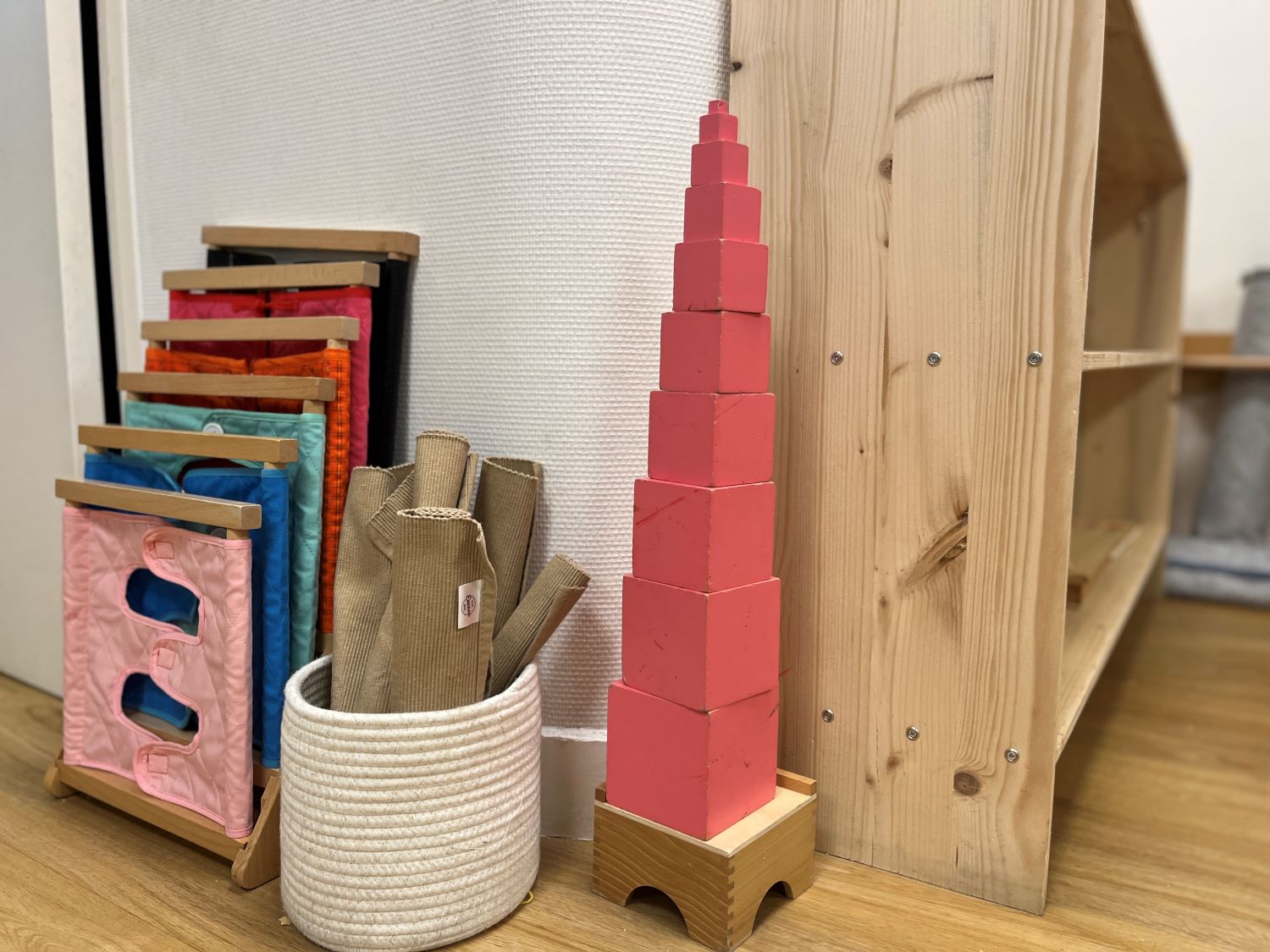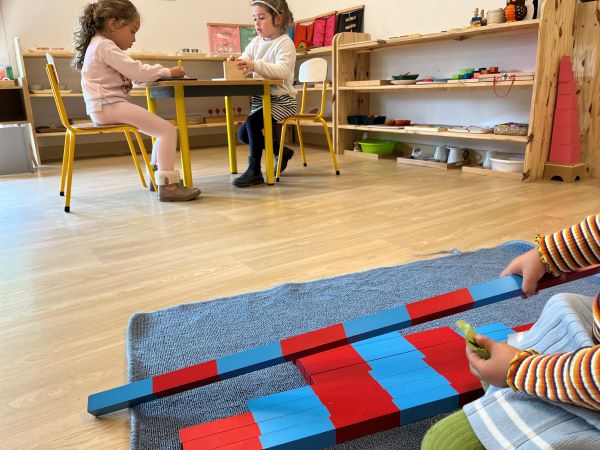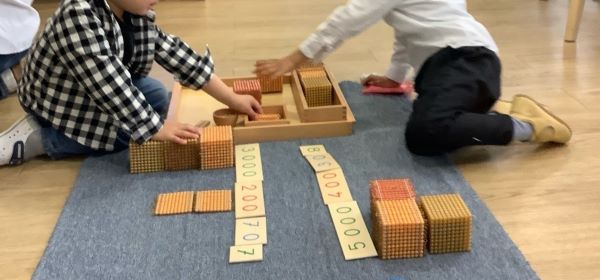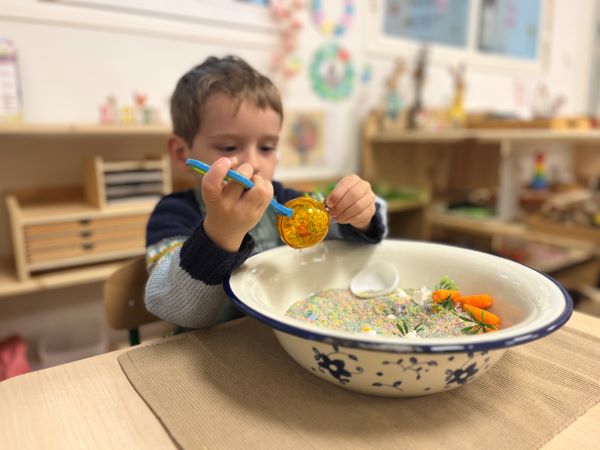3-6 years
6-12 years
Montessori
Montessori: 6 preconceived ideas to deconstruct
September 9, 2025

Montessori: 6 preconceived ideas to deconstruct
The aim of this article is to set the record straight, to re-establish some of the truths about Montessori pedagogy, and above all to show how, at Esclaibes International Schools, we go further. Beyond the strict application of the pedagogy initiated by Maria Montessori, we practice an active pedagogy, enriched by modern tools (work plans, philosophy workshops, group projects, work on emotions, sports, nature and culture outings, bilingual immersion...).
Myth no. 1 - In a Montessori school, children are allowed to do everything.
This is undoubtedly the most frequent criticism: in a Montessori school, children do "what they want", with no framework or rules. The reality is very different.
Freedom is a central principle of Montessori pedagogy. But it's freedom within a structured framework. This framework is set by various parameters to be respected, such as the class timetable, operating rules, and the human and material environment.
- The children choose their activities from those presented to them, complete them and then put them away.
- Students can choose where and with what they work: for example, they can set up on a carpet for their activities or on a table.
- Respect for others, the working environment and equipment is a fundamental rule. Running around the classroom, disturbing a classmate or using equipment inappropriately is not part of this freedom.
So it's a regulated freedom.
At Esclaibes International Schools, we ensure that this autonomy is exercised in a climate of caring and security. Our educators welcome emotions, accompany moments of separation or frustration, and provide a clear framework in which each child can develop serenely.
This approach enables children to develop both their freedom of choice and their personal responsibility, in an environment that gives them confidence.

Myth n°2 - Montessori children are not prepared for the "real world".
Another oft-heard criticism is that children trained in a Montessori school would have difficulty adapting to traditional schools or, more broadly, to life in society.
In fact, the opposite is true. Montessori pedagogy develops essential psychosocial skills: autonomyself-confidence, the ability to learn from mistakes, but also respect for others and cooperative work. cooperative work thanks to multi-age classes. These solid foundations enable children to face change with confidence and integrate easily into new school or social environments.
At Esclaibes International Schools, we go even further to prepare children for today's world. In addition to academic learning, our students :
- are made aware of cultural diversity;
- take part in collective projects, such as those to develop their ecological awareness;
- reflect inphilosophy workshops ;
- take part in sporting activities;
- take part in numerous nature and cultural outings.
These experiences help them to develop their critical thinking, creativity and openness to the world, all qualities that are essential to evolve in today's society.

Myth 3 - Montessori = no teacher
Some imagine that a Montessori classroom would function without a teacher, leaving the children to fend for themselves.
In reality, the teacher has a central role, but one that differs from that found in traditional education. In a Montessori classroom, the adult is first and foremost a guide:
- he observes;
- it prepares the environment ;
- he presents the equipment;
- it intervenes at just the right moment.
Rather than imposing a collective rhythm, it accompanies each child on his or her personal journey, fostering autonomy and confidence.
At Esclaibes International Schools, our teachers are trained in Montessori pedagogy through our partner organization, Apprendre Montessori, but not only that: they also integrate other approaches to enrich the children's experience.
Work plansphilosophy workshops, personalized follow-up and group projects complete the Montessori framework. This professional posture guarantees both pedagogical rigor and individualized, attentive support for every dimension of the child's development.

Myth 4 - Montessori is only for toddlers
People often think that Montessori pedagogy is reserved for kindergartens, or even nurseries, and that it loses its appeal beyond that.
In reality, Montessori is based on universal principles that can be adapted to all ages: the development ofautonomy, respect for personal rhythm, the caring and guiding posture of the adult, as well as coherent consistent teaching materials and identical in both French- and English-speaking environments. Even a child who didn't start out in kindergarten can join a Montessori class in elementary school and quickly find his or her bearings.
At Esclaibes International Schools, the principles of Montessori pedagogy remain the backdrop to the teaching provided in kindergarten, elementary and middle school. But we open up our pedagogy to other complementary practices that are not part of the approach described by Maria Montessori. We also offer pedagogical continuity from kindergarten to college, with balanced bilingual immersion in French and English. As a result, children grow up in a coherent, progressive framework that prepares them for academic learning, international-mindedness and the world of tomorrow.

Myth n°5 - Montessori is about materials and nothing else
The best-known images of Montessori pedagogy are those of colorful beads, rough letters and a pink tower. Some conclude that Montessori is just a particular kind of teaching material.
In reality, Montessori material is just a tool: it enables the child to understand concepts in concrete terms before moving on to abstraction. Designed to be self-correcting, they help students to identify errors on their own and build their confidence. But it is not an end in itself: what counts is the experience gained and the support provided by the adult.
In our schools, we complement this material with a broader, more modern approach: group projects, development of creativity, cultural diversity, openness to today's issues such as ecology and artificial intelligence.
In this way, children learn not only to manipulate and understand, but also to think, collaborate and invent.

Myth 6 - Montessori is for the elite
Because Montessori schools are private, we often hear that this pedagogy is reserved for an elite.
It's true that attending a Montessori school can involve a substantial budget, which is why this misconception is so common. In particular, this budget is linked to operating costs (specific materials, small classes, rental of premises, in-depth teacher training, etc.). And even if our dearest wish is that our pedagogy be accessible to as many people as possible, unfortunately this is not possible.
(To find out more, read our article dedicated to Montessori school fees.)
Montessori pedagogy, on the other hand, is universal and adaptable. It's not for the elite. Designed to respect the rhythm of each child, it is for everyone, regardless of social or cultural background.
In the Esclaibes International Schoolswe welcome a wide variety of students, ensuring their well-being, inclusion and personal development. More than an educational method, it's a human approach, focused on the success and confidence of every child, whatever their background.
Montessori pedagogy is often caricatured through preconceived ideas. Yet its essence is based on theautonomy, respect and trust accorded to each child.
In each of our schools in the heart of Paris, in the Paris region or in Marseille, we go beyond "pure Montessori": our pedagogy is enriched, international and adapted to the challenges of the XXIᵉ century. Work plans, philosophy workshops, project-based pedagogy, bilingual immersion, attention to well-being and emotions, sport, nature and culture... so many dimensions that enable every student to grow fully and serenely.
Find out more about our schools and our teaching approach on the blog and on our school pages.

FAQ - Received ideas about Montessori
Do Montessori children really do what they want?
No. They enjoy freedom of choice, but always within a structured framework that respects the rules of the class and of others. The freedom children enjoy is carefully framed by rules that teach responsibility, respect for others and self-discipline. It's an approach that aims to prepare children not only to succeed academically, but also to become respectful individuals in society.
Can Montessori children adapt to a conventional school?
Yes, they develop autonomy, self-confidence and social skills that enable them to adapt easily to new school environments. What's more, we can attest to the fact that, in addition to being bilingual, the students who have been enrolled in our schools have an excellent academic record, which makes it easier for them to adapt to another educational system.
Is Montessori just teaching materials?
Materials are an essential support, but not an end in themselves. Montessori pedagogy is based above all on adult guidance, autonomy and cooperation.
Is Montessori education reserved for an elite?
No. It's designed for all children, whatever their social background. What makes this elitist pedagogy so popular is the fact that tuition fees at these private schools are often very high. At Esclaibes International Schools, we're very transparent and make our fees available for Paris 15, Paris 16, Paris 8, Clichyand Marseille.
In fact, depending on the school and its operating costs, fees can be higher or lower. And as much as we'd like to make our teaching methods accessible to as many people as possible, reality catches up with us as a non-contractual private school. In the meantime, our Wednesday bilingual workshops and themed bilingual vacation courses are open to all children, whether enrolled in our schools or not.

5
Campus
+20
Nationalities
2
Teachers per class of 18 pupils
+300
Families place their trust in us

Want to give it a try?
Would you like to offer your child the opportunity to develop in one of our international schools? It's possible to book a tour of our facilities.
.svg)
OUR BLOG
You may also like

0-3 years
3-6 years
6-12 years

4 minutes
December 12, 2025
How can you balance indulgence and nutrition at breakfast?
Simple, helpful tips to help your child eat a balanced breakfast.

3-6 years
6-12 years

8 minutes
November 10, 2025
Individualized support at school: foundations and practices
In our schools, we draw on research in the cognitive sciences to offer learning adapted to each student.

3-6 years
6-12 years
Montessori

4 minutes
September 9, 2025
Montessori: 6 preconceived ideas to deconstruct
Untangle the truth from the false and understand Esclaibes Schools' pedagogical vision.

.svg)


.jpg)
.svg)
.svg)
.svg)
.svg)
